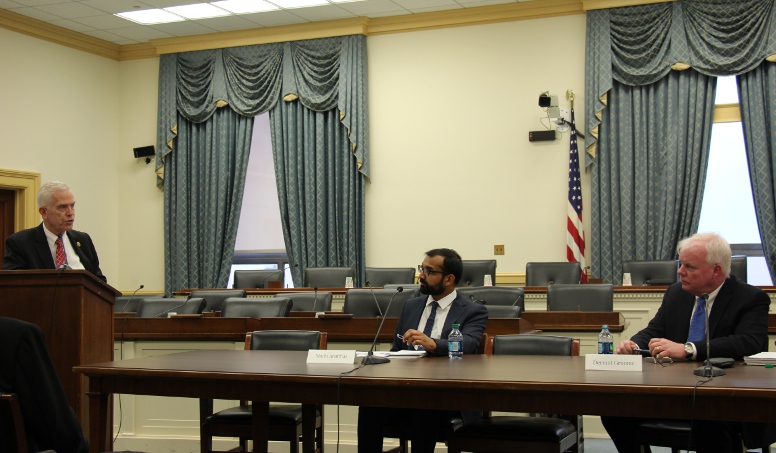The US Congressional Caucus on Ethnic and Religious Freedom in Sri Lanka was given an update on the current situation in Sri Lanka and on developments in the UN Human Rights Council, during a briefing in the Longworth House Office Building in Washington DC earlier this month.
The briefing, attended by staff from the State Department, Congress, the Foreign Relations Committee, as well as interested members of the public, started with caucus co-chair Congressman Bill Johnson's introductory remarks, who said it was critical that the international community remained vigilant about Sri Lanka's new government's progress on accountability and political reform.
Mario Arulthas, advocacy director for PEARL, a DC-based NGO, spoke about his recent trip to Sri Lanka's North-East and shared his experiences speaking to survivors of the armed conflict, families of the disappeared and victims of landgrabs. Mr Arulthas said he was able to document ongoing violations of human rights in all 8 districts, especially around security forces harassment.
 |
|
Rep Bill Johnson, Mario Arulthas and Professor Dermot Groome |
While pointing out that some space for civil society and human rights activists had opened up since the new government came into power over a year ago, he stressed that serious concerns remained as the structures of oppression remained in place. Former combatants were still the victims of physical abuse by security forces and families of the disappeared face continued harassment, he said.
Mr Arulthas said that many Tamils who had voted for President Sirisena last year did so with some hope for genuine change, however explained to the caucus that this hope had largely dissipated. Hope in the international community was also dissipating, as the Sri Lankan government is re-embraced into the international fold, he further said.
"There is growing resentment at the lack of meaningful changes and at what is perceived as a military occupation, with the camps and victory monuments. While it is important to be supportive of Sri Lanka's transition, it is also important to maintain Tamil people's confidence in the international community," Mr Arulthas said, stressing that international pressure remained necessary to hold Sri Lanka accountable to its promises.
Professor Dermot Groome, an expert on international criminal law, from the Dickinson School of Law from Penn State University, presented a detailed briefing on the OHCHR's report on Sri Lanka and the subsequent resolution passed at the UN Human Rights Council.
He highlighted the findings of the UN report, which detailed ongoing crimes against the Tamil people and that the new government also refused to cooperate with the investigation leading up to the report.
Recounting his experience as prosecutor at the UN International Criminal Tribunal for the former Yugoslavia (ICTY), the academic pointed out that it was not a challenging investigative task to identify soldiers and victims in the video evidence of atrocities against Tamils, saying that they did it within a month at the ICTY.
Asked about lessons he learned from his experience in the ICTY, Professor Groome stressed the necessity of a functioning international presence, arguing that this was necessary to investigate genocide.
"I've prosecuted genocide cases and in Sri Lanka genocide should be looked at. A panel of Sinhalese judges would not do that," he said. He further said that there was no reason why the international community couldn't consider setting up an ad-hoc tribunal.
In his closing remarks, Congressman Bill Johnson reiterated the importance of international participation in any moves towards accountability in Sri Lanka and pledged to meet with Assistent Secretary of State Nisha Biswal to discuss these issues.
To see Professor Groome's presentation slides click here.
